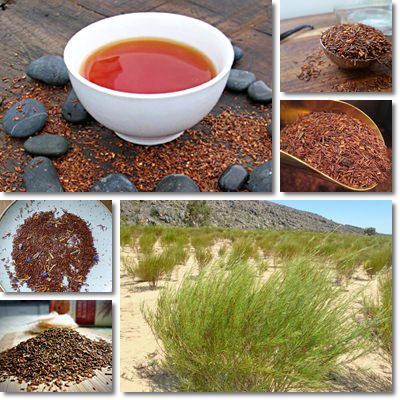Increasingly famous, rooibos (Aspalathus linearis) has become a popular flavor among avid tea drinkers. However, rooibos is not a tea herb proper, but a legume native to South Africa. The dried, needle-like leaves of the plant native to Southern Africa are used to make rooibos tea, as well as other similarly-flavored drinks, popular throughout the world and, more importantly, famous for their high antioxidant value, anti-anxiety effects and mild sedative properties.
Rooibos is rich in antioxidants and flavonoids, natural compounds believed to offer protection against harmful free radicals that can damage cells and DNA and encourage mutations and chronic disease development. Moreover, when consumed with regularity, tea made from the leaves of this bushy plant is shown to lower triglyceride and LDL (bad) cholesterol levels, thus contributing immensely to cardiovascular health.

What is rooibos?
Rooibos is a green, bushy plant with needle-thin light green leaves that grows in a small region in South Africa. The supermarket or health store version of the plant is actually dried, oxidized rooibos, meant to last longer and taste better.
- Green rooibos is also available, nevertheless it is more expensive and tastes a bit grassy due to undergoing different production processes than red rooibos.
- The readily available red rooibos has a more exquisite taste. More important, it is a priceless source of antioxidants with great cancer-preventive properties.
Rooibos benefits and uses
A laboratory study conducted on mice showed that the rodents who were given rooibos ‘tea’ instead of water were less susceptible to DNA damage as a result of free radical action. According to the researchers conducting the experiment, two powerful flavonoids in rooibos ‘tea’, aspalathin and nothofagin, protected the rodents’ DNA from suffering mutations that could possibly lead to cancers. Seen that rodent DNA is pretty similar to that of humans, it is believed that the potent anticancer properties of rooibos can protect us too from DNA damage and tumor-causing mutations in cells.
As a side note, the rooibos ‘tea’ given to mice was more likely a sort of pure extract, much more concentrated than regular tea most of us have access to. Nevertheless, the potent antioxidants in the regular tea still play an active role in DNA protection, no matter the concentration they are presented into.

Another laboratory study on mice showed that rooibos promotes liver detoxification and regeneration following a prolonged intoxication. More exactly, mice given rooibos-based drinks showed less fibrotic liver tissue than those that were merely given water. Following several similar experiments, researchers have come to the conclusion that quality rooibos tea is efficient in the prevention of liver disease and can also be used as an adjuvant in various therapies aiming to treat lives disease. Numerous studies vouch for the powerful hepatoprotective properties of the herb.
Drinking rooibos tea regularly is said to help reduce blood pressure and alleviate allergic conditions. Also, rooibos is recommended for respiratory conditions as it is both a bronchodilator and an antispasmodic. When you take asthma or allergy medication, for example, the active ingredients in the respective medication act as bronchodilators, meaning they help relax and dilate or open airway paths and thus help more air get into the lungs. Rooibos acts in the same way, however, it is best used as a complementary natural therapy, not a substitute for essential medication. Although it can help improve respiratory problems, you should not go off medication until talking to your doctor.
While some people can keep asthma and allergies under control by drinking rooibos tea, taking (1 g) vitamin C and staying hydrated, others may need to stay on medication at least for a while. Rooibos tea owes its broncho-dilating and antispasmodic effects to chrysoeriol, a flavonoid which promotes blood vessel relaxation.
Because rooibos tea is caffeine-free, it might be a good choice of a tea before going to bed. Also, because it lacks this powerful stimulant, rooibos may be a good alternative if you are dealing with extrasystoles. But this depends on the individual response of your body to various foods and drinks. Similarly, the herb is reported to be a good anti-anxiety natural remedy, but may have various effects on different people.
Speaking about cardiovascular health, rooibos appears to help lower triglyceride and LDL (bad) cholesterol levels, while increasing HDL (good) cholesterol levels. Moreover, rooibos tea improves blood sugar levels and insulin secretion so it might not be the worst idea to drink a cup of rooibos tea after a meal from time to time.
Overall, rooibos is full of wonderful benefits. Because it is a rich source of antioxidants, it offers great protection against DNA damage caused by free radicals, prevents cancer-causing cell mutations, delays physical and mental aging. It also promotes the regeneration of the liver, helps maintain a healthy heart and alleviates asthma and seasonal allergies symptoms.
Conclusion
However, as good as it is, it is always best to consult with your doctor prior to taking on any form of natural therapy, especially if you are suffering from an existing condition that requires careful and sustained medication. Just to be on the safe side. If hot rooibos tea isn’t to your liking, you can always turn it into a cold, refreshing ice tea.
